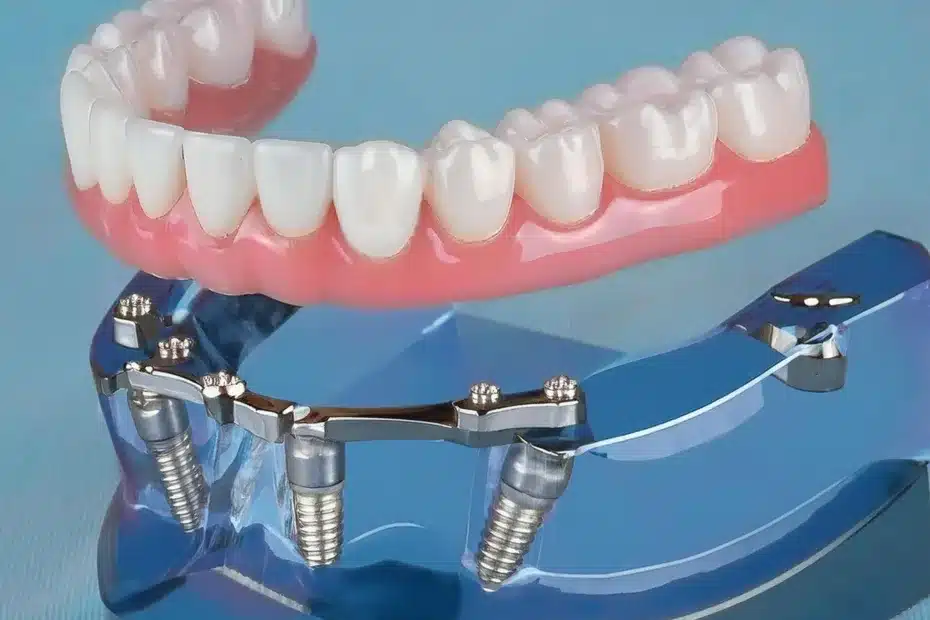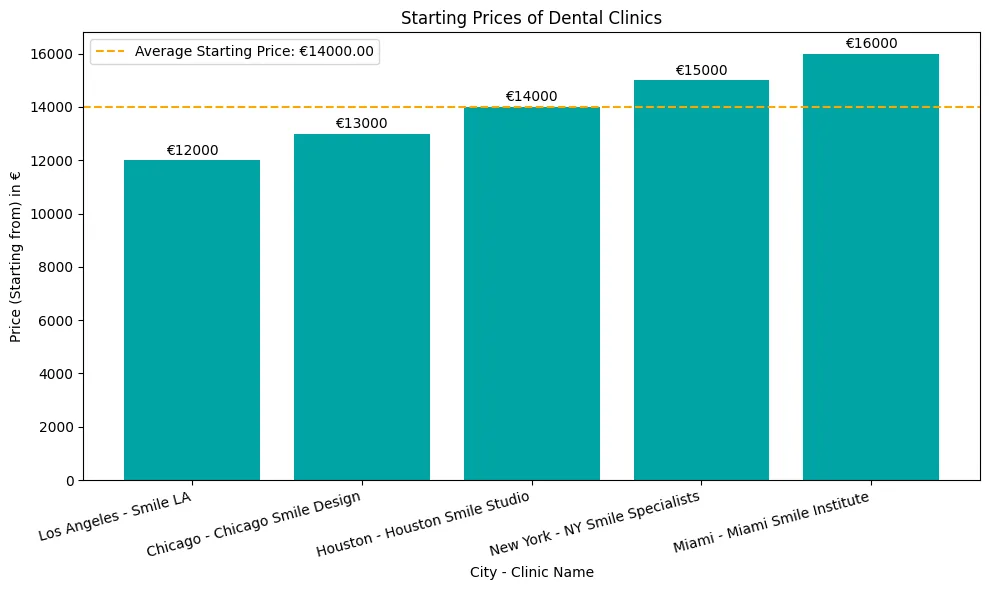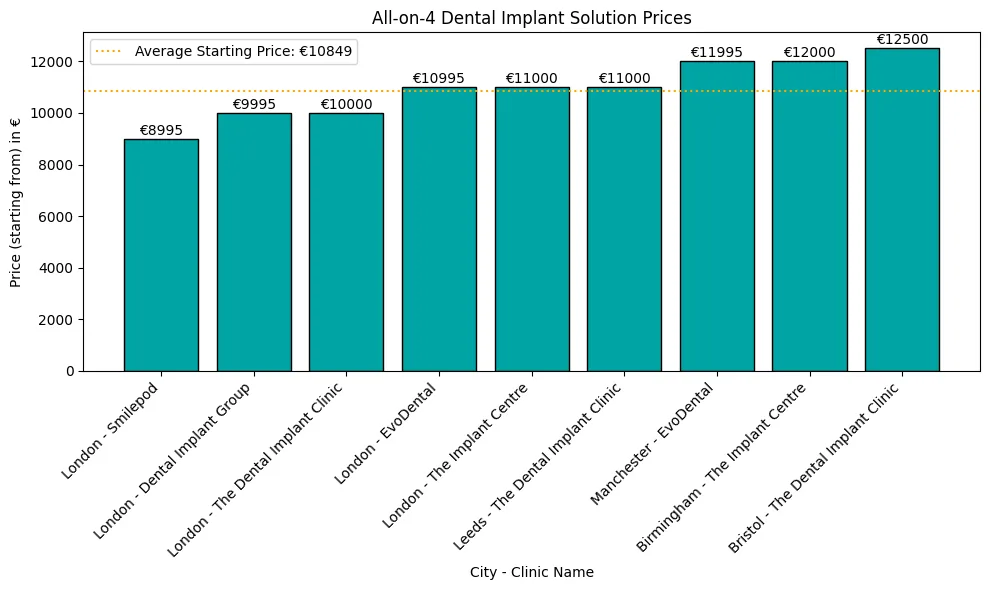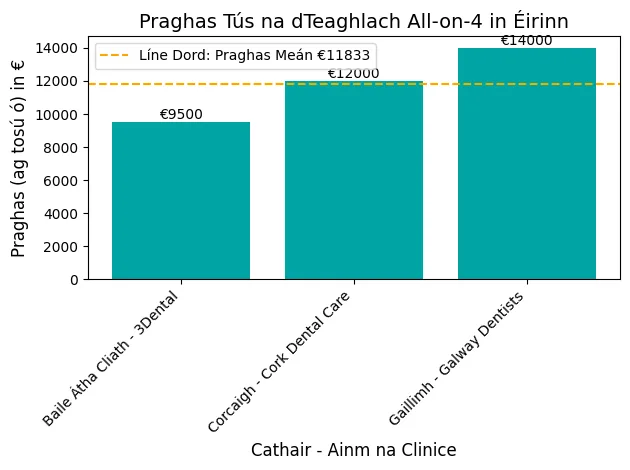Are you sick of dentures or missing teeth, struggling to chew and speak, and feeling self-conscious about your smile?
If you are looking for a permanent solution to regain your confidence and quality of life, a dental implant full mouth may be the answer.
What are full-mouth Mouth Dental Implants?
Full-mouth dental implants ,are a permanent solution with a 95% success rate over ten years, replacing all teeth in the upper or lower jaw. They improve stability, comfort, and chewing function while preserving jawbone health. Costs range from €10,000 to €30,000 depending on complexity and implant numbers.
| Feature | Traditional Dentures | Full Mouth Dental Implants |
|---|---|---|
| Stability and Comfort | Less stable, may cause discomfort (3) | More stable, provides superior comfort (2) |
| Chewing Function | May have limitations, reduced bite force (3) | Improved chewing function, increased bite force (2) |
| Bone Preservation | No stimulation, potential bone loss (2) | Stimulates jawbone, preserves bone health (2) |
| Cost | Lower initial cost, but may require more frequent replacements or adjustments (2) | Higher initial cost, but more durable and long-lasting (2) |
| Lifespan | Typically needs to be replaced every 5-7 years (3) | Can last a lifetime with proper care and maintenance (4) |
Types of Full Mouth Dental Implant
All-on-4
The All-on-4 is a full-mouth dental implant system that uses 4 implants to support a full arch of teeth.
This system is for patients with limited bone density in the jaw and is used in the lower jaw.
According to a study, the All-on-4 has a 95% success rate over 5 years with a mean bone loss of 1.3 mm (5).
This system also reduces the need for bone grafting, which is a big advantage for patients who want a minimally invasive treatment.
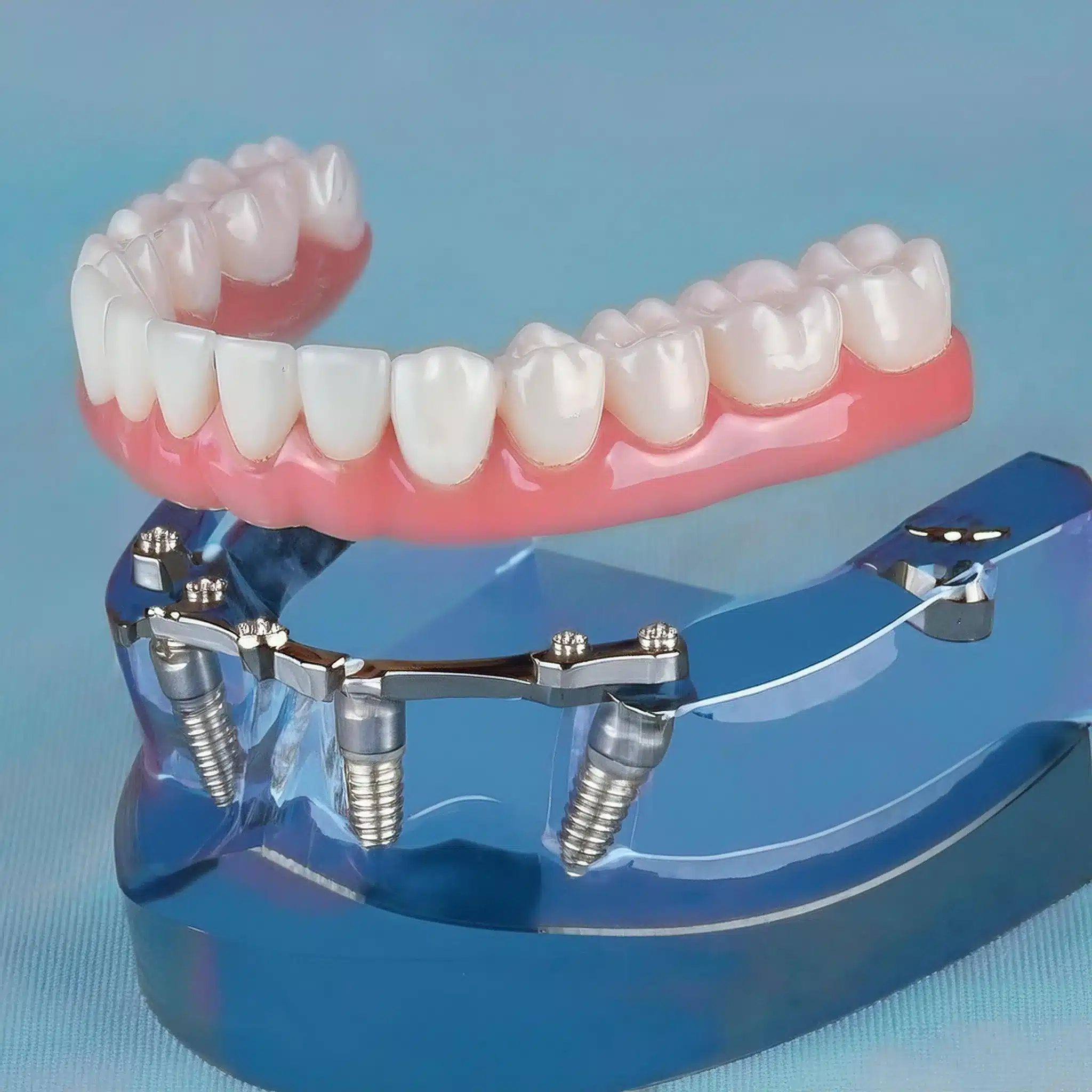
All-on-6
The All-on-6 is another full-mouth dental implant system that uses 6 implants to support a full arch of teeth.
This system is for patients with more bone density in the jaw and is used in the upper jaw.
According to a study, the All-on-6 has a 96.7% success rate over 8 years with a mean bone loss of 1.1 mm (6).
This system also provides more stability and support for the teeth, which is a big advantage for patients who want a more secure solution.
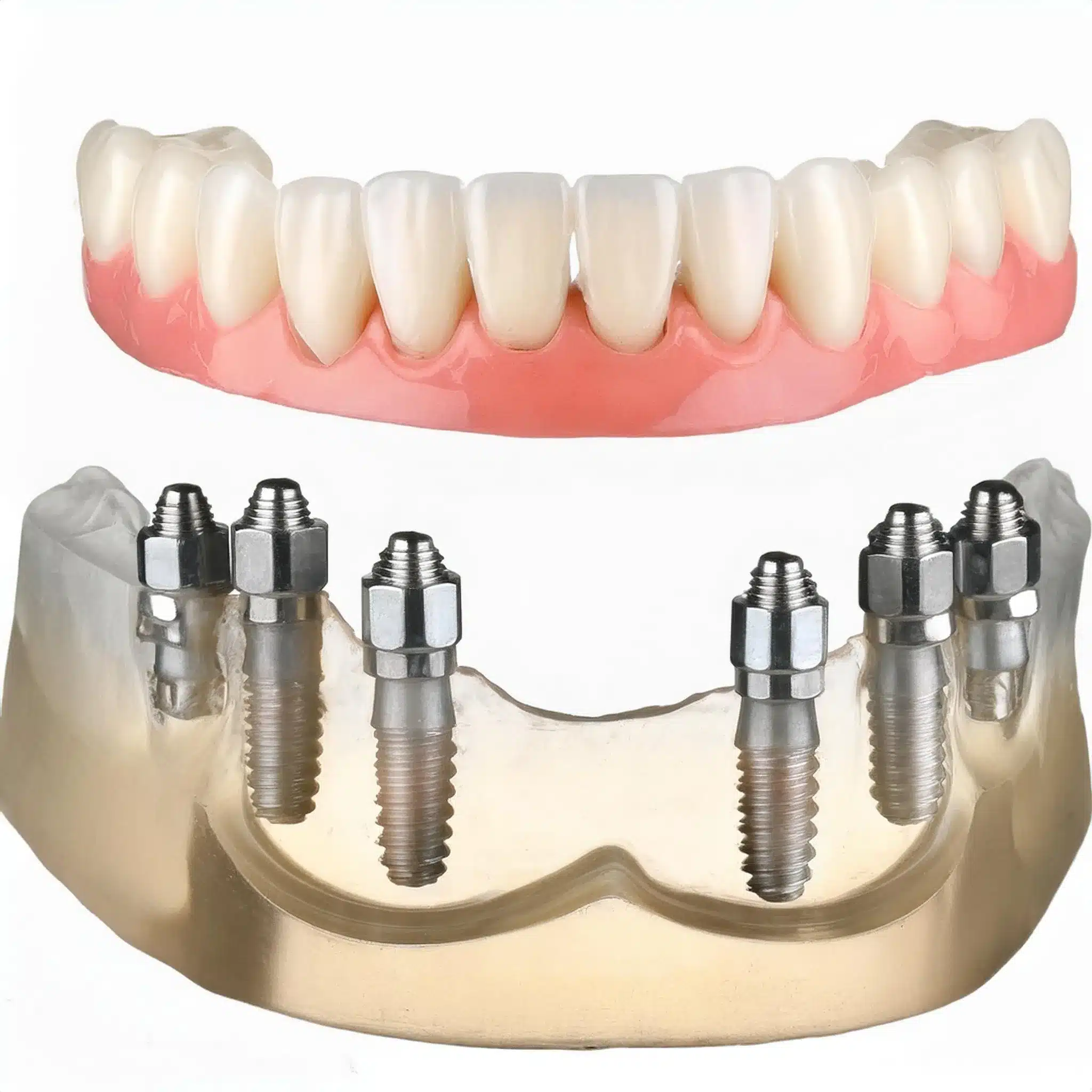
All-on-8
The All-on-8 is a full-mouth dental implant system that uses 8 implants to support a full arch of teeth.
This system is for patients with high bone density in the jaw and is used in both upper and lower jaw.
According to a study, the All-on-8 has a 98.2% success rate over 5 years with a mean bone loss of 0.8 mm (5).
This system also provides the most stability and support for the teeth, which is a big advantage for patients who want the most secure solution.
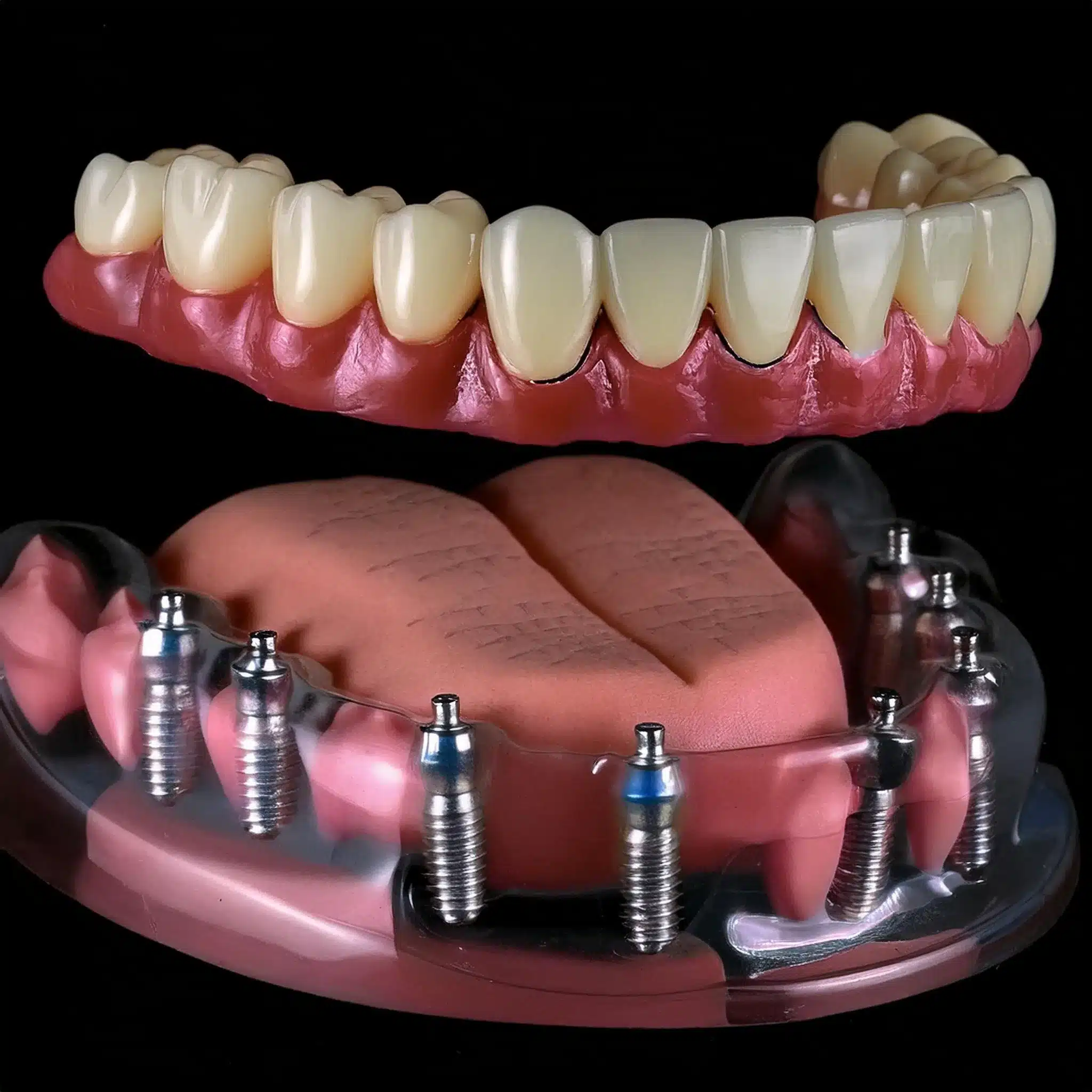
Advantages of Full-Mouth Dental Implants
Comfort and Stability
Full-mouth dental implants are very comfortable and stable; patients can eat, speak, and smile with confidence.
According to a study, dental implants have a 10-year survival rate of 90-95% (2).
This means that with proper care and maintenance, full-mouth dental implants can last for many years.
Compared to Traditional Dentures
Full-mouth dental implants are a more stable and comfortable solution than traditional dentures.
Unlike dentures, which can slip or fall out, full-mouth dental implants are anchored to the jawbone, giving a natural-looking and comfortable smile.
In fact, a study found that 16% of patients rehabilitated with implants experience peri-implantitis after 9–14 years, which is a relatively low complication rate (2).
Bone Preservation
Full-mouth dental implants can also preserve the jawbone, which can resorb over time due to tooth loss.
A study found that the placement of dental implants resulted in a significant reduction in the height of the alveolar bone in the maxilla but not in the mandible (1).
This means that full-mouth dental implants can preserve the jawbone and prevent further bone loss.
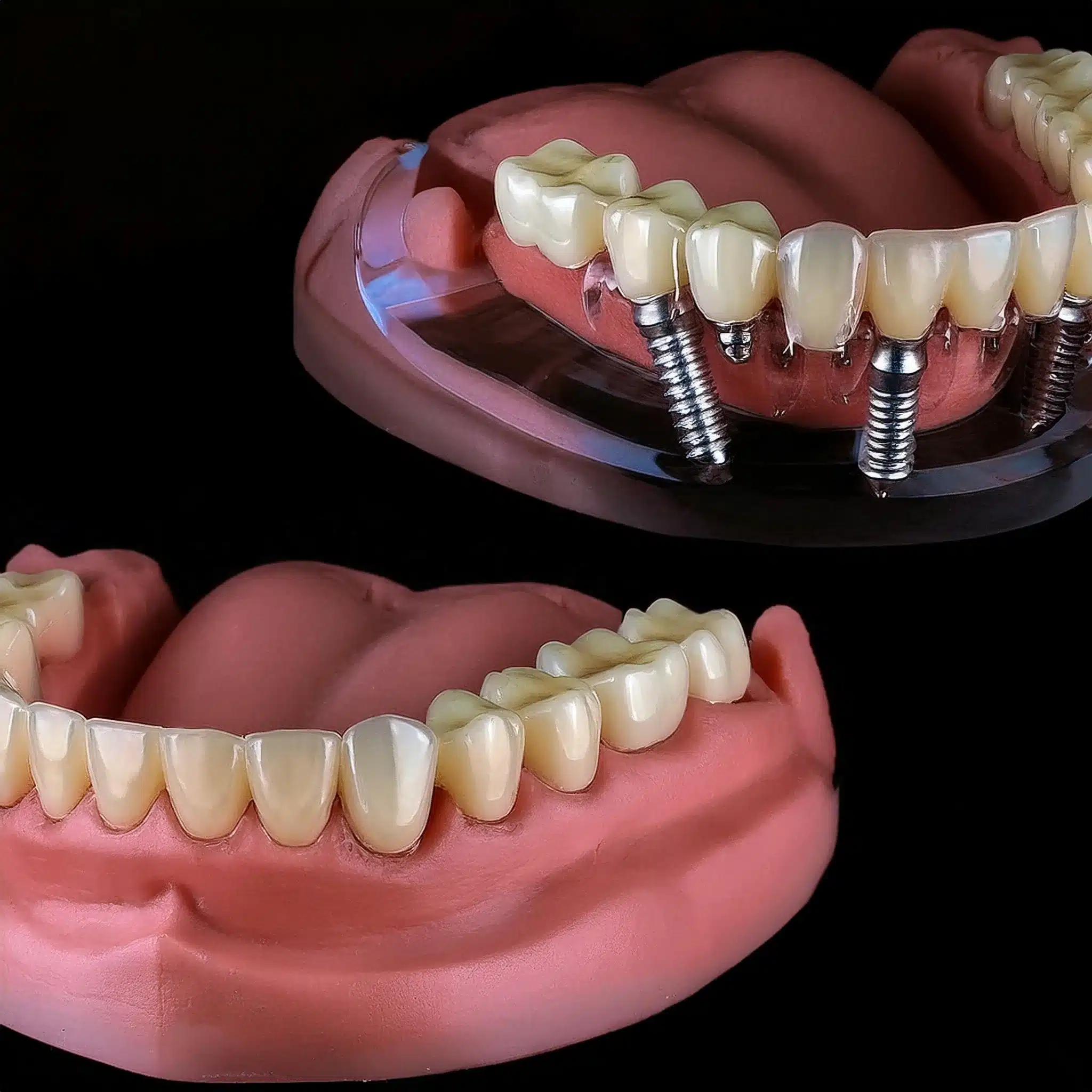
Full-mouth Mouth Dental procedures
Initial Consultation and Assessment
The first step in the full-mouth dental implant procedure is an initial consultation and assessment with a dental specialist.
During this consultation, the specialist will evaluate the patient’s overall health, dental health, and jawbone density to determine if they are a suitable candidate for the treatment.
According to a study, the success rate of dental implants is higher when the implant is placed in a site with adequate bone density (4).
The specialist will also discuss the treatment options and create a personalized treatment plan.
Treatment Planning
Treatment planning is a key part of the full-mouth dental implant procedure.
The specialist will use imaging technologies such as CT scans and X-rays to create a 3D model of the patient’s jawbone and surrounding tissues.
This model will be used to plan the implant placement.
A study found that 3D imaging can improve the accuracy of implant placement by up to 30%.
The implant surgery process involves placing 4-6 dental implants in the upper or lower jawbone.
The implants are made of titanium and are designed to integrate with the surrounding bone tissue.
According to a study, titanium implants can reduce the risk of implant failure by up to 50% (6).
The surgery is done under local anesthesia and takes around 1-2 hours.
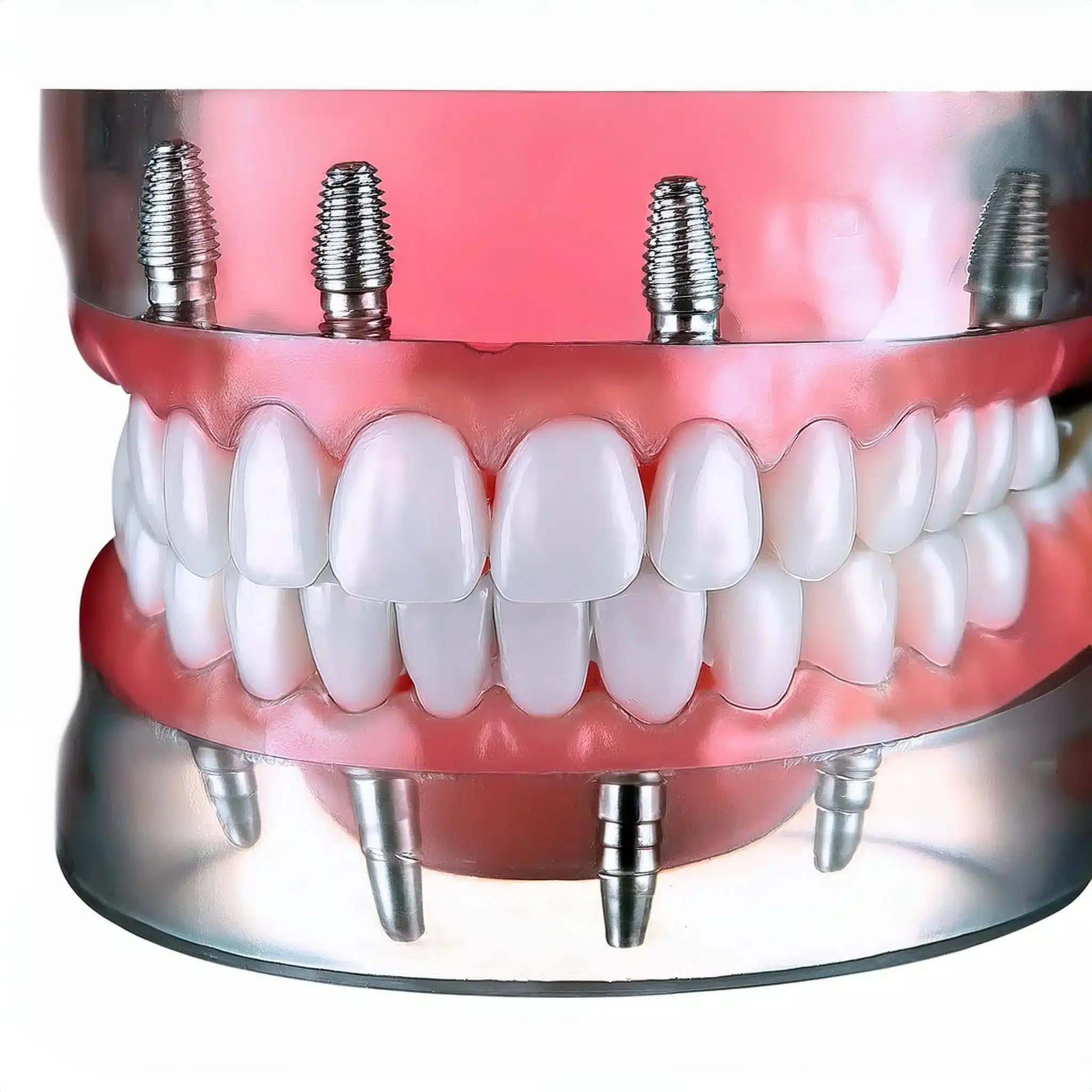
Recovery and Follow-ups
After the surgery, the patient will need to follow a strict recovery protocol to ensure proper healing and minimize the risk of complications.
This may include a soft food diet, pain medication and regular follow-up appointments with the specialist.
According to a study, the recovery period for dental implant surgery can be 3-6 months, depending on the complexity of the procedure (3).
Post-Procedure Care and Maintenance
Daily Oral Hygiene
After a full-mouth dental implant procedure, it is important to maintain good oral hygiene to prevent complications and ensure the longevity of the implants.
According to a study, the placement of dental implants resulted in a significant increase in the density of the alveolar bone in both the maxilla and mandible (2).
To maintain this bone density, patients should brush their teeth at least twice a day with a soft-bristled toothbrush and fluoride toothpaste.
Also, patients should floss once a day to remove any food particles and plaque from between the teeth and around the implants.
Check-ups and Professional Cleaning
Check-ups and professional cleaning are important to maintain the health and longevity of the dental implants.
According to a study, the 8-year cumulative survival and success rates for 2359 implants were 96.7% and 93.3%, respectively (5).
To achieve similar success rates, patients should schedule check-ups with their dentist every 6 months to ensure the implants are functioning well and any potential issues are addressed promptly.
Also, patients should have professional cleaning every 3–4 months to remove any plaque and tartar that may have accumulated around the implants.
| Feature | Traditional Dentures | Full Mouth Dental Implants |
|---|---|---|
| Stability and Comfort | Less stable, may cause discomfort (3) | More stable, provides superior comfort (2) |
| Chewing Function | May have limitations, reduced bite force (3) | Improved chewing function, increased bite force (2) |
| Bone Preservation | No stimulation, potential bone loss (2) | Stimulates jawbone, preserves bone health (2) |
| Cost | Lower initial cost, but may require more frequent replacements or adjustments (2) | Higher initial cost, but more durable and long-lasting (2) |
| Lifespan | Typically needs to be replaced every 5-7 years (3) | Can last a lifetime with proper care and maintenance (4) |
Conclusion & Key-Takeaways
Key-Takeaways
Full-mouth dental implants are a permanent solution for missing teeth with a success rate of up to 95% (1).
The procedure involves 4–8 implants in the upper or lower jawbone to support a full arch of teeth.
Full-mouth dental implants can last 25–30 years with proper care and maintenance (2).
The treatment can preserve the jawbone and prevent bone loss, which can lead to facial sagging and premature aging.
Full-mouth dental implants can also maintain the natural shape of the face.
Conclusion
Full-mouth dental implants are a proven and effective solution for missing teeth and a permanent and natural-looking smile.
With a high success rate and long-lasting results, full-mouth dental implants can improve the quality of life for patients with missing teeth.
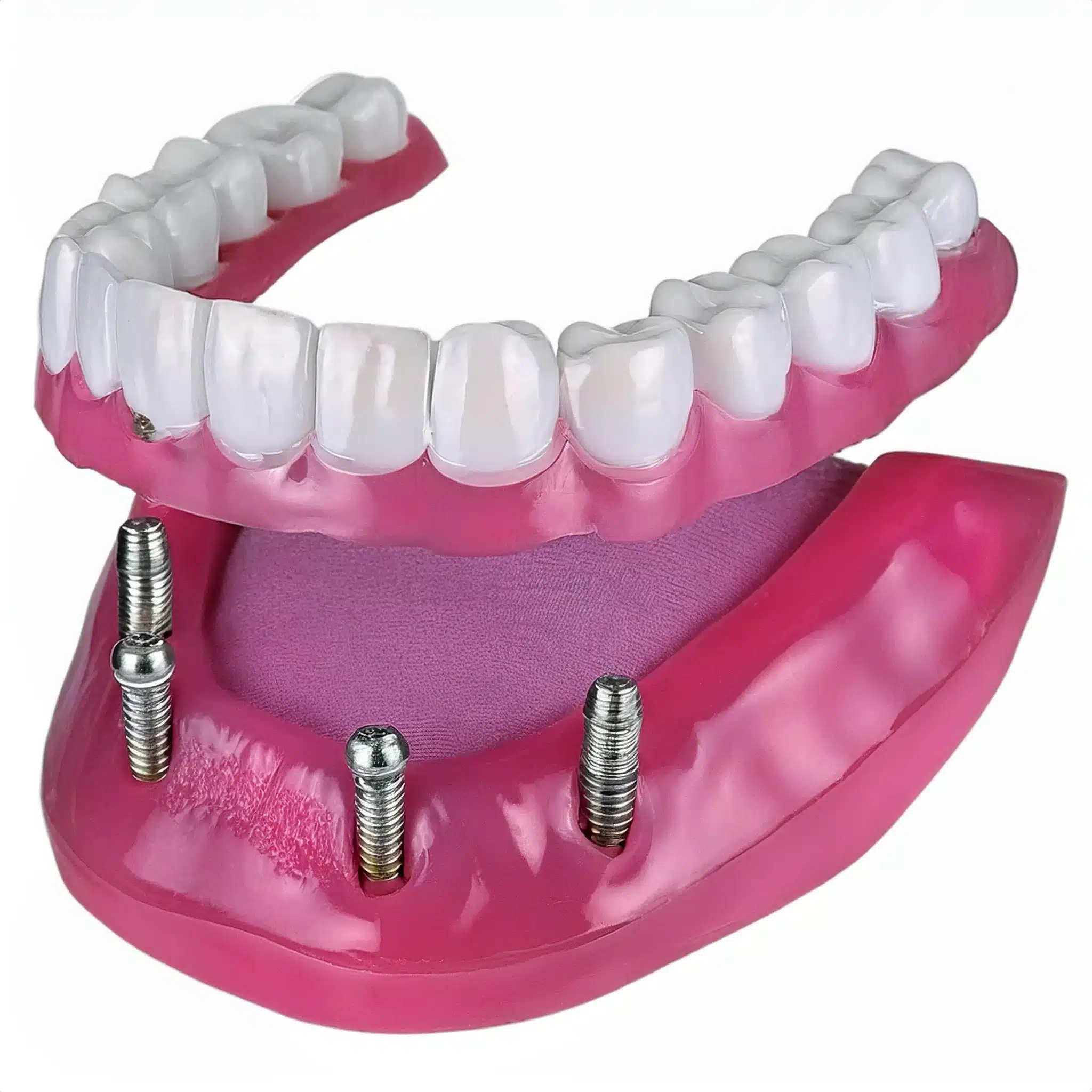
FAQ
References
Esposito M, et al. Interventions for replacing missing teeth: different types of dental implants. Cochrane Database Syst Rev. 2014;(7):CD003815.
Article: Interventions for replacing missing teeth: different types of dental implants
Linkow LI. Dental implants: A review. J Oral Implantol. 2016;42(1):15-24.
Article: Dental implants: A review
Esposito M, et al. Interventions for replacing missing teeth: dental implants in fresh extraction sockets (immediate, immediate-delayed and delayed implants). Cochrane Database Syst Rev. 2009;(2):CD005968.
Albrektsson T, et al. Osseointegrated titanium fixtures in the treatment of dentulousness. Biomaterials. 1983;4(1):25-28.
Article: Osseointegrated titanium fixtures in the treatment of dentulousness
Adell R, et al. A 15-year study of osseointegrated implants in the treatment of the edentulous jaw. Int J Oral Surg. 1981;10(6):387-416.
Article: A 15-year study of osseointegrated implants in the treatment of the edentulous jaw
Buser D, et al. Long-term evaluation of non-submerged ITI implants. Part 1: 8-year life table analysis of a prospective multi-center study with 2359 implants. Clin Oral Implants Res. 1997;8(3):161-172.

